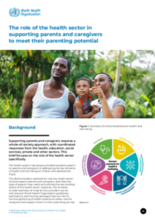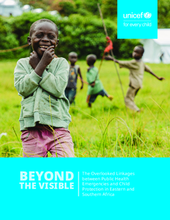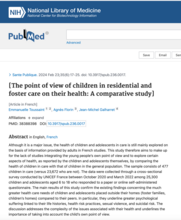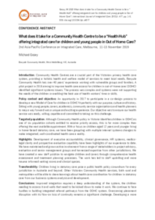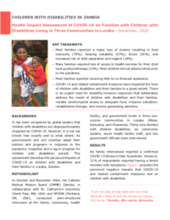Displaying 1 - 10 of 244
Supporting parents and caregivers requires a whole-of-society approach, with coordinated responses from the health, education, social services, private and other sectors. This brief focuses on the role of the health sector specifically. It explains why the health sector should support parents and caregivers, describes the type of support they need, and outlines the key building blocks of the health sector response.
This technical brief examines how public health emergencies in Eastern and Southern Africa—such as polio, cholera, Ebola, Marburg, and mpox—disrupt protective environments and increase risks of violence, exploitation, and neglect for children, including those without parental care. Drawing on lessons from multiple countries, it highlights scalable approaches to embed child protection in health responses and calls for coordinated frameworks that ensure care continuity and resilience during future crises.
Integrated healthcare models combining behavioral and primary care provide solutions for vulnerable pediatric populations, especially youth in foster care, facing disproportionately high rates of chronic conditions and mental health issues. This review synthesizes current literature to assess the impact of integrated care on health outcomes for youth in foster care in the U.S..
Providing comprehensive healthcare to children in foster care can be challenging. This discussion provides healthcare providers in the US with a practical, trauma-informed guide to caring for youth in foster care rooted in evidence-based practice and current guidelines.
Although it is a major issue, the health of children and adolescents in care is still mainly explored on the basis of information provided by adults in French studies. This study therefore aims to make up for the lack of studies integrating the young people’s own point of view and to explore certain aspects of health, as reported by the children and adolescents themselves, by comparing the health of children in care with that of children in the general population.
This video explores the pivotal role of health care practitioners in supporting nurturing care for children.
This article evaluates a pilot project in 2016 aiming to improve health care access for children in out-of-home care (OOHC) in Victoria, Australia and identifies significant systems issues.
The New Neighborhood is a limited series podcast that explores some of the dramatic changes taking place across the U.S. as people work to reinforce a sense of community, support young children and families, and work to build equity within communities.
Catholic Medical Mission Board Zambia (CMMB), SPOON, and St. Catherine's University conducted this Health Impact Assessment (HIA) in Lusaka Province, Zambia, to understand the disparate impact that COVID-19 and the containment measures had on children with disabilities and their families. his two-phased assessment is designed to gather evidence about the impact through seven domains: COVID-19 knowledge and practices, food consumption, housing and livelihood, child safety and risk of separation, child health and wellness, parental and child stress, and education.
This paper explores how pediatricians can support families who care for children and adolescents who are fostered and adopted while attending to children’s medical needs and helping each child attain their developmental potential.

